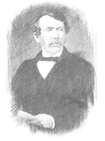L - Past-Witnesses-File
- Robert G Lee - Dennis Leonard - HC Leupold - David Livingstone - Jim Logan - Gary D Long - Christopher Love -
==robert g lee=================
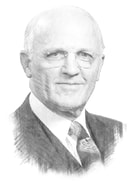 Robert G Lee
Robert G Lee
The destruction of sin is extensive. Sin abuses the body and makes that which should be the temple of the Holy Ghost, the temple of the Holy Ghost, the temple which the Devil uses. As the traders in the Temple at Jerusalem made God's house "a den of thieves," so sin makes the human body a den where iniquities find dwelling place and iniquities issue. As sin would pull God out of His throne, abusing His authority, His justice, His power, His wisdom, His patience, His mercy, His holiness, His promises, so sin would abuse all the powers and defile all the precincts of the human body. --Robert G Lee; Yielded Bodies; 1954
==dennis leonard=========
Pastor Dennis Leonard began fulfilling his call to the ministry in 1985 when he founded Heritage Christian Center in the basement of his home as “simply a Bible study”. Church Growth Today has named Heritage Christian Center, “one of America’s 100 fastest growing churches.” Heritage Christian Center hit its 39-year anniversary mark in 2023; and it is still a fast-paced, multicultural, nondenominational church. Dennis Leonard finished his call to ministry on November 1, 2018, and stepped into the presence of his Lord & Savior. His legacy lives on today through the multiple community outreaches he created during his lifetime with the vision passed onto his wife, Michele Leonard. Dennis Leonard was driven by his desire to assist men and women in their efforts to become and achieve their personal best, no matter their age, socio, economic or cultural background. He saw potential in everyone, and believed that once that potential was tapped, nothing could hold someone back from achieving anything. Pastor Leonard’s teaching style has been described as, “unique, educational, and uplifting”, often times using memorable illustrations during his sermons. As a noted author, Dennis Leonard authored over 15 books, including, “Your Best Days are Still Ahead” and his best sellers, “Happiness Matters” and "Love Matters". Other books include “Don’t Judge My Future By My Past”, “Forgiveness Matters”, “Failure Is Not the End”, and “Keys to Financial Freedom”.
Obituary:
Dennis Gene Leonard March 13, 1949 — November 1, 2018. Dennis Gene Leonard, 69 of Aurora, Colorado stepped into the presence of the Lord on Thursday November 1, 2018. Pastor Leonard was born March 13, 1949 to Gene and Pauline Leonard in Hollywood, California. Pastor Leonard will be forever remembered as an amazing Husband, Father, Friend, Teacher and Soul Winner. The joy of the Lord was his strength and he would help guide anyone in hopes that they would prosper.
Dennis Gene Leonard March 13, 1949 — November 1, 2018. Dennis Gene Leonard, 69 of Aurora, Colorado stepped into the presence of the Lord on Thursday November 1, 2018. Pastor Leonard was born March 13, 1949 to Gene and Pauline Leonard in Hollywood, California. Pastor Leonard will be forever remembered as an amazing Husband, Father, Friend, Teacher and Soul Winner. The joy of the Lord was his strength and he would help guide anyone in hopes that they would prosper.
Heritage Christian Center and Dennis Leonard returning to Colorado
Dennis Leonard built Heritage Christian Center into a flourishing multiracial church by connecting with hurting people. From the pulpit, the preacher mined his past life, one of frequenting nightclubs and recovering from divorce. Members volunteered at a church food bank and fed the homeless. The choir was top-notch. Leonard also preached a gospel of prosperity — suggesting a bountiful return for those who gave generously to the church — that has been criticized for preying on the vulnerable
(Denver Post 2/4/14)READ MORE>>>>>
Dennis Leonard built Heritage Christian Center into a flourishing multiracial church by connecting with hurting people. From the pulpit, the preacher mined his past life, one of frequenting nightclubs and recovering from divorce. Members volunteered at a church food bank and fed the homeless. The choir was top-notch. Leonard also preached a gospel of prosperity — suggesting a bountiful return for those who gave generously to the church — that has been criticized for preying on the vulnerable
(Denver Post 2/4/14)READ MORE>>>>>
==H.C. Leupold==============
Dr. Herbert Carl Leupold, Columbus, Ohio, was born at Buffalo, N. Y., on July 23, 1891. He received his early education in the Lutheran parochial schools at Buffalo and later finished his elementary and secondary education in the Buffalo public schools. He received his pre-seminary and seminary training at the Martin Luther Theological Seminary at Buffalo, NY., which was discontinued when the Buffalo Synod became a part of the American Lutheran Church. Dr. Leupold graduated from the Martin Luther Seminary on June 24, 1914. Thereupon he served as pastor of a mission, Ascension Lutheran congregation in Buffalo, and at the same time held an assistant professorship at the Martin Luther Seminary until 1922. He served as professor of historical theology at the Martin Luther Seminary from 1922 to 1929. In 1929, when the Buffalo Synod dosed Martin Luther Seminary, Dr. Leupold was transferred to the Evangelical Lutheran Theological Seminary at Capital University, Columbus, O., where he became professor of Old Testament Theology, in which capacity he is serving at the present time. He was elected secretary of the Theological Seminary faculty in 1941. Dr. Leupold received the Bachelor of Divinity degree from the Chicago Seminary in 1926 and the Doctor of Divinity degree from Capital University in 1935. Dr. Leupold has gained renown as an Old Testament scholar and an authority on liturgics. He has become a well-known lecturer and writer in these fields.
"In a way it may seem as though the unsuspicious Eve, who has never been tempted, is at a grievous disadvantage because of the very subtle nature of the suspicion that the serpent seeks to engender in her heart. But her advantages are sufficient amply to offset the cleverness of the attack. There is, first of all, the discern their very nature. At this point Eve could easily have probed farther and divined the actual truth. Our first parents certainly had been adequately prepared for an emergency such as this.
Empirical knowledge of God’s goodness and mercy toward man. The whole of creation formed a strong symphony of protest against any suspicions of God’s good will. Then, Eve had a very clear word from God, simple and unencumbered by many details as to what her moral duty was. Whether this word was heard immediately from God or mediately from her husband matters little and cannot impair the power of that word upon her heart. And then, too, there was one feature about the temptation that could well have aroused instantaneous suspicion of the tempter: a mere irrational creature spoke. The insight into the limitations of the being of the animal was sufficiently clear to a creature like man, who had but recently been entirely qualified to give names to all these beings.
At this point already we must begin to take issue with the claim that in the temptation as such the penalty resulting is quite out of proportion to the trifling nature of the misdeed. For those who raise such a claim liken the sin of our first parents to the taking of forbidden fruit by children and then claim: the mere taking of an apple certainly does not merit such dreadful consequences as are here pictured as resulting. Over against such misconceptions we strongly maintain that the taking of the fruit was not the fall into sin; that fall had occurred before this act; the taking of the fruit was an incidental bit of evidence of the fact that man had fallen. However, the Fall as such was nothing less in character than an entirely inexcusable piece of rebellion against a very gracious Father who not only had withheld nothing good from man but had even bestowed such an overwhelming wealth of good things that revolt against such a one must in the very nature of the case be a sin of the deepest hue, yes, even the one great sin in the history of the human race. "
-H.C. Leupold (1892-1972)
Empirical knowledge of God’s goodness and mercy toward man. The whole of creation formed a strong symphony of protest against any suspicions of God’s good will. Then, Eve had a very clear word from God, simple and unencumbered by many details as to what her moral duty was. Whether this word was heard immediately from God or mediately from her husband matters little and cannot impair the power of that word upon her heart. And then, too, there was one feature about the temptation that could well have aroused instantaneous suspicion of the tempter: a mere irrational creature spoke. The insight into the limitations of the being of the animal was sufficiently clear to a creature like man, who had but recently been entirely qualified to give names to all these beings.
At this point already we must begin to take issue with the claim that in the temptation as such the penalty resulting is quite out of proportion to the trifling nature of the misdeed. For those who raise such a claim liken the sin of our first parents to the taking of forbidden fruit by children and then claim: the mere taking of an apple certainly does not merit such dreadful consequences as are here pictured as resulting. Over against such misconceptions we strongly maintain that the taking of the fruit was not the fall into sin; that fall had occurred before this act; the taking of the fruit was an incidental bit of evidence of the fact that man had fallen. However, the Fall as such was nothing less in character than an entirely inexcusable piece of rebellion against a very gracious Father who not only had withheld nothing good from man but had even bestowed such an overwhelming wealth of good things that revolt against such a one must in the very nature of the case be a sin of the deepest hue, yes, even the one great sin in the history of the human race. "
-H.C. Leupold (1892-1972)
==david livingstone==========
David Livingstone (19 March 1813 – 4 May 1873) was a Scottish physician, Congregationalist, and pioneer Christian missionary with the London Missionary Society, an explorer in Africa, who wanted to abolish slavery, and one of the most popular British heroes of the late 19th-century Victorian era. David was the husband of Mary Moffat Livingstone, from the prominent 18th-century missionary family, Moffat. Livingstone had a mythic status that operated on a number of interconnected levels: Protestant missionary martyr, working-class "rags-to-riches" inspirational story, scientific investigator and explorer, imperial reformer, anti-slavery crusader, and advocate of British commercial and colonial expansion. Livingstone's fame as an explorer and his obsession with learning the sources of the Nile River was founded on the belief that if he could solve that age-old mystery, his fame would give him the influence to end the East African Arab–Swahili slave trade. "The Nile sources", he told a friend, "are valuable only as a means of opening my mouth with power among men. It is this power [with] which I hope to remedy an immense evil." His subsequent exploration of the central African watershed was the culmination of the classic period of European geographical discovery and colonial penetration of Africa. At the same time, his missionary travels, "disappearance", and eventual death in Africa—and subsequent glorification as a posthumous national hero in 1874—led to the founding of several major central African Christian missionary initiatives carried forward in the era of the European "Scramble for Africa".

David Livingstone was one of the most consequential individuals who lived in the nineteenth century. An unpretentious Scottish missionary doctor, explorer and abolitionist, he opened the door for Christianity in southern Africa. Vance Christie’s biography is the most comprehensive and accurate ever written about Livingstone. During his lifetime he was a hero in Britain and beyond, and gained a degree of respect, trust, appreciation and even affection with many African people. He was a man who overcame many deprivations and discouragements, and displayed the utmost measure of courage, self–control, faith, wisdom and ingenuity. Christie takes a balanced look at Livingstone’s amazing achievements, but also at his very real flaws. This gripping in–depth biography is a must–read insight into a fascinating man -Release Date: July 2023 by Vance Christie

On The Record: The National: Nov 9, 2021:
DESTITUTE and gravely ill, Livingstone was revived with the food and medicine which Stanley brought. The two men became firm friends and went on short expedition together to explore Lake Tanganyika before Stanley had to return to the USA with his great story, which was soon to become famous.
Stanley would go on to become a great explorer of Africa himself, while Livingstone was determined to carry on with his attempt to find the source of the Nile, a task set for him by the great Scottish explorer Sir Rodney Murchison.
By now he was in completely the wrong place, however, and when he became ill in April, 1873, this time there was no rescue. He died in what is now Zambia around May 1, being found in an attitude of prayer.
His heart was buried near where he died and his embalmed body was taken to London where he was buried in Westminster Abbey. Stanley was knighted, became an MP and died in 1904.
The day Stanley met Livingstone in Africa – 150 years on
DESTITUTE and gravely ill, Livingstone was revived with the food and medicine which Stanley brought. The two men became firm friends and went on short expedition together to explore Lake Tanganyika before Stanley had to return to the USA with his great story, which was soon to become famous.
Stanley would go on to become a great explorer of Africa himself, while Livingstone was determined to carry on with his attempt to find the source of the Nile, a task set for him by the great Scottish explorer Sir Rodney Murchison.
By now he was in completely the wrong place, however, and when he became ill in April, 1873, this time there was no rescue. He died in what is now Zambia around May 1, being found in an attitude of prayer.
His heart was buried near where he died and his embalmed body was taken to London where he was buried in Westminster Abbey. Stanley was knighted, became an MP and died in 1904.
The day Stanley met Livingstone in Africa – 150 years on
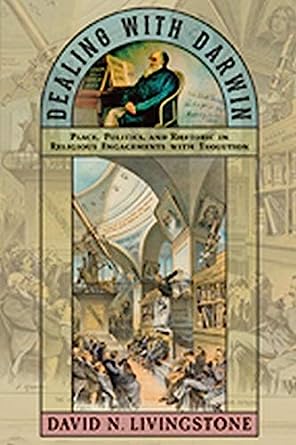
Dealing with Darwin: Place, Politics, and Rhetoric in Religious Engagements with Evolution by David Livingstone
How was Darwin’s work discussed and debated among the same religious denomination in different locations?
Using place, politics, and rhetoric as analytical tools, historical geographer David N. Livingstone investigates how religious communities sharing a Scots Presbyterian heritage engaged with Darwin and Darwinism at the turn of the twentieth century. His findings, presented as the prestigious Gifford Lectures, transform our understandings of the relationship between science and religion.
The particulars of place―whether in Edinburgh, Belfast, Toronto, Princeton, or Columbia, South Carolina―shaped the response to Darwin’s theories. Were they tolerated, repudiated, or welcomed? Livingstone shows how Darwin was read in different ways, with meaning distilled from Darwin's texts depending on readers' own histories―their literary genealogies and cultural preoccupations. That the theory of evolution fared differently in different places, Livingstone writes, is "exactly what Darwin might have predicted. As the theory diffused, it diverged."
Dealing with Darwin shows the profound extent to which theological debates about evolution were rooted in such matters as anxieties over control of education, the politics of race relations, the nature of local scientific traditions, and challenges to traditional cultural identity. In some settings, conciliation with the new theory, even endorsement, was possible―demonstrating that attending to the specific nature of individual communities subverts an inclination to assume a single relationship between science and religion in general, evolution and Christianity in particular.
Livingstone concludes with contemporary examples to remind us that what scientists can say and what others can hear in different venues differ today just as much as they did in the past.
How was Darwin’s work discussed and debated among the same religious denomination in different locations?
Using place, politics, and rhetoric as analytical tools, historical geographer David N. Livingstone investigates how religious communities sharing a Scots Presbyterian heritage engaged with Darwin and Darwinism at the turn of the twentieth century. His findings, presented as the prestigious Gifford Lectures, transform our understandings of the relationship between science and religion.
The particulars of place―whether in Edinburgh, Belfast, Toronto, Princeton, or Columbia, South Carolina―shaped the response to Darwin’s theories. Were they tolerated, repudiated, or welcomed? Livingstone shows how Darwin was read in different ways, with meaning distilled from Darwin's texts depending on readers' own histories―their literary genealogies and cultural preoccupations. That the theory of evolution fared differently in different places, Livingstone writes, is "exactly what Darwin might have predicted. As the theory diffused, it diverged."
Dealing with Darwin shows the profound extent to which theological debates about evolution were rooted in such matters as anxieties over control of education, the politics of race relations, the nature of local scientific traditions, and challenges to traditional cultural identity. In some settings, conciliation with the new theory, even endorsement, was possible―demonstrating that attending to the specific nature of individual communities subverts an inclination to assume a single relationship between science and religion in general, evolution and Christianity in particular.
Livingstone concludes with contemporary examples to remind us that what scientists can say and what others can hear in different venues differ today just as much as they did in the past.
==jim logan=====================
Dr. Jim Logan (B.A., Biola Universtiy; graduate studies at Talbot School of Theology, La Mirada, California) is a counselor at Biblical Restoration Ministries, Inc. in Sioux City, Iowa. He spent more than 20 years as a pastor and has taught at several Bible colleges. He has traveled around the world teaching on spiritual warfare, strongholds, and spiritual walk with God. His wife, Marguerite, went to be with the Lord in April, 2015. He has four children, eight grandchildren, and nine great-grandchildren.
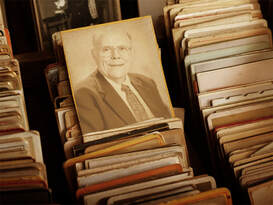 Jim Logan Files
Jim Logan Files
After cautioning us not to let our anger simmer overnight, Paul says, "Neither give place to the devil." The word translated place here is the Greek word topos. This word might look familiar to you even in its original form. It's at the root of English words like topography, and refers to the ground or a specific spot or location.
So giving place to Satan in our lives is giving him a ground, a "foothold" according to the New International Version of the Bible, an "opportunity" (NASB and Revised Standard Version). a "chance" (Today's English Version). On the other side, one commentator describes Paul's admonition as allowing the devil "no leeway...no room to move." ----Jim Logan "Reclaiming Surrendered Ground" p. 33
So giving place to Satan in our lives is giving him a ground, a "foothold" according to the New International Version of the Bible, an "opportunity" (NASB and Revised Standard Version). a "chance" (Today's English Version). On the other side, one commentator describes Paul's admonition as allowing the devil "no leeway...no room to move." ----Jim Logan "Reclaiming Surrendered Ground" p. 33
==gary d long==================
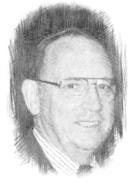 Gary D Long
Gary D Long
There are two key words in this verse which have caused great theological debate. The principal one, as previously stated, is agorazõ, which is translated “bought.” The other word is despostës, which is translated “Lord.” Almost every universal redemptionist says this verse teaches that the false prophets, who are obviously non-elect, are nevertheless bought (redeemed) by the blood of Christ. Yet they say, since these false prophets continue to deny Christ and never believe, there must be an aspect of redemption (as reflected in this verse by the word agorazõ) which was designed for the non-elect as well as for the elect. The issue between the modified and five-point Calvinists, therefore, is twofold. First, it must be determined whether “Lord” (despotes) refers to God the Father or to God the Son as mediator, or to God the Father or God the Son as sovereign Lord. Second, it must be decided whether “bought” (agorazõ) is to be understood redemptively (referring to salvation or soteriologically), as most modified Calvinists claim, ornon-redemptively (non-soteriologically), as most consistent Calvinists claim. --Gary D Long; Redemption in II Peter 2:1
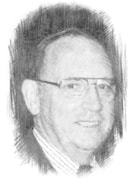 Gary D Long
Gary D Long
“Christ came not to make the law void but rather to explain and enforce it, that he might render holiness more evident and raise his people to greater exercise in it than ever before. And it should be the aim and design of all Christians, for Christ’s sake as well as their own and others, that their graces may be resplendent in the holiness and universal righteousness that as the apostle directs, “they may adorn the gospel,” (Titus 2:10), and walk worthy of their relationship to God (Col. 1:10).”
---William Williams, The Danger of Not Reforming Known Evils, and Other Works, (Crossville, TN: Puritan Publications, 2022)
---William Williams, The Danger of Not Reforming Known Evils, and Other Works, (Crossville, TN: Puritan Publications, 2022)
==christopher love==============
Christopher Love (1618 – 22 August 1651) was a Welsh Protestant preacher and advocate of Presbyterianism at the time of the English Civil War. In 1651 he was executed by the government, after it was discovered that he had been in correspondence with the exiled Stuart court. He went to his death as a hero and martyr of the Presbyterian faction which had petitioned in vain for his pardon. He became domestic chaplain to John Warner, the sheriff of London. There he met his future wife Mary, daughter of Matthew Stone, formerly a merchant in London, who was the sheriff’s ward. Love received an invitation to become lecturer at St. Ann’s, Aldersgate, but was for three years refused his allowance by William Juxon, the bishop of London; Laud had warned Juxon to keep an eye on Love. Declining episcopal ordination, he went to Scotland to seek it at the hands of the presbytery; but the Scottish Church had decreed to ordain only those who settled among them. On his return to England, about 1641, he preached at Newcastle before the mayor and aldermen, when he expressed himself so freely against the Book of Common Prayer, that he was committed to gaol. He was subsequently removed to London on a writ of Habeas Corpus, was tried in the king’s bench, and was acquitted. Around the outbreak of the First English Civil War he preached as a lecturer at Tenterden, Kent, on the lawfulness of a defensive war, and was accused of treason; but he was acquitted and recovered his costs. Shortly afterwards he was made chaplain to Colonel John Venn‘s regiment, and became preacher to the garrison of Windsor Castle
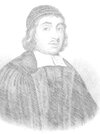 Christopher Love
Christopher Love
The Christian never shines in grace til he comes into the fire of afflictions; especially if he suffers in bearing witness to the truth of Christ. We should be content, yes even rejoice, in our sufferings and not desire death to be rid of the troubles of this life.
--Christopher Love
The Christian never shines in grace til he comes into the fire of afflictions; especially if he suffers in bearing witness to the truth of Christ. We should be content, yes even rejoice, in our sufferings and not desire death to be rid of the troubles of this life.
--Christopher Love


